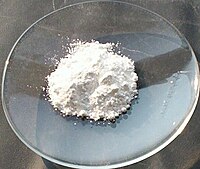
Photo from wikipedia
Abstract Understanding solid-state zinc-ion conduction will not only be academically interesting but also benefit the development of energy-dense devices. However, zinc ions in conventional ceramic and polymer hosts are only… Click to show full abstract
Abstract Understanding solid-state zinc-ion conduction will not only be academically interesting but also benefit the development of energy-dense devices. However, zinc ions in conventional ceramic and polymer hosts are only mobile at high temperatures, and intriguing questions remain regarding the correlation between ionic local environment and conductivity performance. Here, we demonstrate a room-temperature fast zinc-ion conduction in solids with a high degree of molecular flexibility and elucidate the subtle trade-off between molecular-scale interactions and ion transport properties. Importantly, a determining role of the strong cation-anion pairing in suppressing zinc-ion mobility has been experimentally uncovered. When removed, the upper limit of ionic conductivity can be extended to the order of 10−4 S/cm, exceeding those of previous solid (solvent-free) zinc-ion conductors. Concomitant with the reversible plating/stripping of zinc (over 700 h), the successful creation of solid-state zinc-ion batteries confirms the practical applicability of the resultant conductors.
Journal Title: Materials Today Energy
Year Published: 2021
Link to full text (if available)
Share on Social Media: Sign Up to like & get
recommendations!